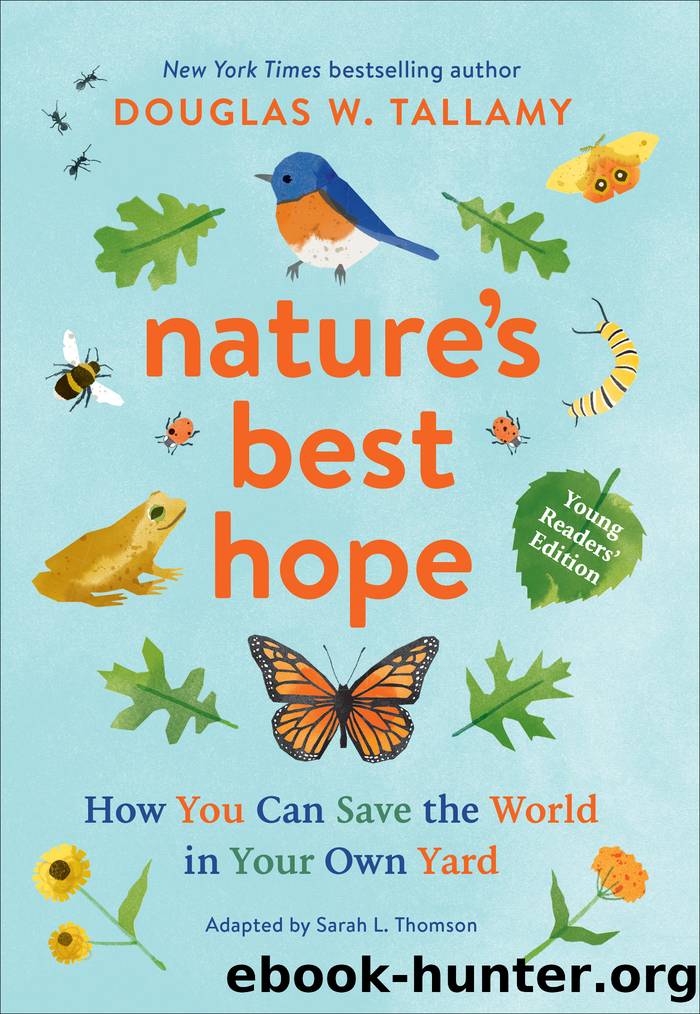Nature's Best Hope (Young Readers' Edition) by Douglas W. Tallamy

Author:Douglas W. Tallamy
Language: eng
Format: epub
Publisher: Timber Press
Published: 2023-09-15T00:00:00+00:00
Itâs strange that we donât appreciate them.
Do you know people who panic when they see a spider or who go out of their way to step on an ant? Are you one of those people?
First of all, calm down. Second of all, keep reading and see if you can develop a new attitude toward the tiny creatures that are actually keeping you alive.
Swatting a fly or slapping a mosquito here and there is one thing, but human beings have declared war on insects. We spray our lawns and gardens and farms with poisons, trying to kill them, and Iâm sorry to say that weâre succeeding.
You know already that there are only a few monarch butterflies left. Karner blue butterflies, European honeybees, and four thousand species of native bees in North America are also in trouble.
Three species of North American bumblebees are already extinct. Thirty percent of grasshoppers, crickets, and katydids in Europe are at risk. Forty-six species of butterflies and moths have disappeared completely from Germany. The number of insects in the world has gone down by 45 percentânearly halfâsince 1974.
Okay, I know. Mosquitoes bite us. Bees sting us once in a while. (Only a few kinds, and not very often!) Flies are annoying. Itâs true.
But once we understand how important insects are, and how most of them canât hurt us at all, we can learn to change how we feel about them. And then we can change how we treat them.
After all, weâve done it before.
We once hunted whales close to extinction because we saw them as nothing more than a source of oil to light our lamps. Now we protect them. We thought of wolves as deadly predators to be slaughtered. Now weâve brought them back to Yellowstone, where they are keeping the park balanced and healthy. Egrets were nearly wiped out because we loved to see their long white feathers in ladiesâ hats. Now these graceful birds soar over the Everglades again.
If we did it for these larger animals, we can do it for insects. (And for their arachnid cousins like spiders too.) We can learn to share the earth with the animals who are making it possible for us to live here.
Weâd better.
Download
This site does not store any files on its server. We only index and link to content provided by other sites. Please contact the content providers to delete copyright contents if any and email us, we'll remove relevant links or contents immediately.
| Container Gardening | Hydroponics |
| Organic | Propagation & Cultivation |
| Topiary | Urban |
| Water Gardens & Ponds |
Turbulence by E. J. Noyes(8040)
The Thirst by Nesbo Jo(6929)
Gerald's Game by Stephen King(4641)
Be in a Treehouse by Pete Nelson(4032)
Marijuana Grower's Handbook by Ed Rosenthal(3676)
The Sprouting Book by Ann Wigmore(3584)
The Red Files by Lee Winter(3411)
The Remains of the Day by Kazuo Ishiguro(3390)
Sharp Objects: A Novel by Gillian Flynn(3004)
Christian (The Protectors Book 1) by L. Ann Marie(2688)
Organic Mushroom Farming and Mycoremediation by Tradd Cotter(2686)
The Culinary Herbal by Susan Belsinger(2477)
Stone Building by Kevin Gardner(2389)
The Starter Garden Handbook by Alice Mary Alvrez(2333)
Lilac Girls by Martha Hall Kelly(2298)
The Unlikely Pilgrimage of Harold Fry by Rachel Joyce(2265)
The Lean Farm Guide to Growing Vegetables: More In-Depth Lean Techniques for Efficient Organic Production by Ben Hartman(2132)
Urban Farming by Thomas Fox(2101)
Backyard Woodland by Josh VanBrakle(1924)
